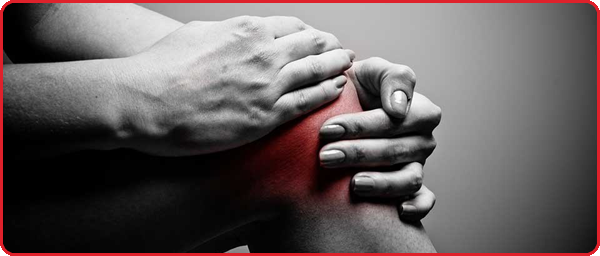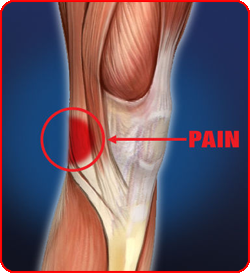KNEE PAIN MANAGEMENT

Pain Management of the knee involves two chief aspects:
Relieving the pain and consequent agony
Addressing the cause of pain

RELIEVING PAIN
In case of an injury, we advise the RICE regime
R - Rest (Splint the knee or use a good Knee Support)
I - Ice Compresses 10-15 mins each every 4 hours
C - Compression (A Light Compression Bandage)
E - Elevation (Keep the knee on a pilliow)
- An anti-inflammatory (such as an Aceclofenac & Paracetamol combination) is a good supplement to this therapy.
- Patients presenting with painful swollen knees at the clinic gain immediate knee-pain-management-noida-delhi-india relief from the Intermittent Pneumatic Cryotherapy Device. Fluid accumulated in the knee as a result of injury or inflammation is removed and the Cryocuff applied for approximately 20 minutes. This results in dramatic relief of pain and swelling.
- Patients presenting with painful knees as a result of mild to moderate arthritis can experience good relief from one of the following injections:
- Steroids with Local Anaesthetics : Steroids help in reducing inflammation and thus pain. One or two injections at an interval of a month are acceptable; however, repeated steroid injections might cause more damage than good. Such injections are generally given by Rheumatologists and some Orthopaedic Surgeons in patients suffering from Rheumatoid Arthritis.
- Viscosupplementation : These injections consist of substances which replicate lubricating enzymes present in a normal knee. These lubricants reduce friction between the thigh and leg bone in arthritis (which otherwise occurs due to the reduced space between these two bones). Unfortunately, in approximately 50% of patients, their effect weans off in 6-12 months. This is a good way of managing young patients with moderate arthritis or delaying a surgical procedure in the elderly. Pain relief is good. These products can be offered as a one off injection or as weekly injections for 5 weeks.
- Manual Physiotherapy Techniques at the Clinic have brought relief to several patients with painful knees. These techniques, popularized by Milligan in the United States, aim at reducing pain by developing coordinated muscle recruitment, stretching unduly taut structures and gentle massages.

ADDRESSING THE CAUSE OF PAIN
- Relieving pain is just half the management. It is important to correct the underlying disease.
- Simple, specific, graduated, supervised exercises by our Specialist Physiotherapists often start the corrective course. Once self reliant, patients are left to pursue these exercises at home. Quite often, 15 -20 minutes of daily exercises are sufficient to achieve healthy, pain free knees. Such regimes help patients with ligament injuries, muscle weakness, abnormal muscle recruitment or coordination, mild to moderate arthritis, post operative situations, etc. Swimming and Static Cycling work wonders with some knee problems.
- In a significant number of patients Viscosupplementation (lubricating enzymes mentioned above) followed by exercises achieves a cure. This is especially useful in patients with mild to moderate arthritis or after a telescopic (arthroscopic) procedure.
- Patients with torn ligaments that do not heal (such as the ACL), torn pieces of articular cartilage (loose bodies) floating in the joint, torn shock absorbers (meniscus), inflammation of the knee lining (synovitis), infections or early arthritis where locking and instability are the chief complaints do respond extremely well to simple Telescopic (Arthroscopic) procedures.
- Patients in pain because of specific fractures can be treated with arthroscopic and minimally invasive means such that they are up and about on their feet the very next day.
- Pain from severe arthritis affecting only a part of the joint can be relieved by Joint Preservation (Joint Realignment & Articular Cartilage Restoration) procedures. Advantages of retaining the patients own knee are obvious. Unicompartmental (Limited) Joint Replacements are another option for the suitable patient.
- Severe arthritis affecting the whole joint requires Total Joint Replacement Surgery. Newer techniques and modern implants have made a tremendous difference in outcomes.


